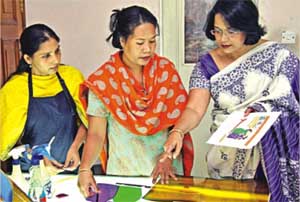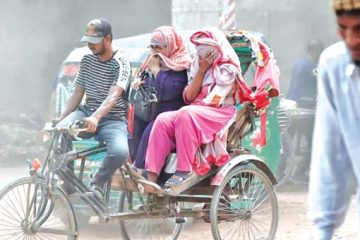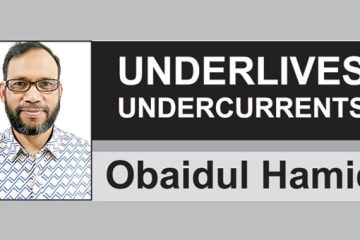Tarique Afzal for The Daily Star
 “Entrepreneur” is a French word that means “undertake”.
“Entrepreneur” is a French word that means “undertake”.
Women entrepreneurship is inherent as they are naturally endowed with the qualities of entrepreneurship. Instincts of a woman generate enormous strength and determination that drive the fear away from them. Entrepreneurship for a woman remains an innate quality and thus is authentic when applied in reality.
In support, the government is relentlessly working to ensure women empowerment, where entrepreneurs will be able to receive services from all government and private/public offices and organisations.
Of late, our Prime Minister Sheikh Hasina expressed her strong commitment to pull the people of Bangladesh out of poverty within the MDG timeframe of 2015.
“Our aim is also to achieve the goals of ‘Digital Bangladesh’ and become a middle income country by 2021,” she said at a function at the Dauphine University in France. President of the university Laurent Batsch handed over a gold medal and a certificate of diploma to Sheikh Hasina in recognition of her contributions for ‘institutionalising and strengthening democratic process and women empowerment in Bangladesh’.
Bangladesh is a resource-limited and overpopulated country where society is highly stratified, services and opportunities are determined by gender, class and location. However, women make nearly half of the population, which means huge potential to be utilised for socio-economic development of the country.
The educational status of women in Bangladesh shows that they are being increasingly educated. Though, the literacy rate of the women remains in average nearly 10 percent. The situation for university-educated women is not better than the illiterate women population of the country. The data of the university students and teachers from 2009 shows that the girl students make more than 41 percent of the total students of the public universities, the share of the women teachers in these universities remained only 18 percent. The share of the women students and teachers of the universities shows that even educated women have to face serious hurdles to profile in the job market.
The constitution guarantees all citizens equal rights, which is also reflected in national policies and plan documents; in reality, there are significant disparities between men and women, rich and poor and rural dwellers in access to the development process both as agents and beneficiaries.
The employment statistics highlights that women in the rural sector are either self-employed or employed in family based enterprises that include both the agricultural and non-agricultural sectors. These activities which include homestead agriculture, livestock and poultry rearing, fish farming, nursery and tree plantation, tool making, fish net making, food processing, tailoring and rice processing, have been regular and invisible sources to family income supplementation. A sector-wise distribution of employed persons in rural areas shows that agriculture is the pre-dominant source of female employment, followed by the manufacturing sector. Women in Bangladesh are employed in low category of jobs. Most of them are employed in the agriculture, forestry and fishery sector, where the share of the women employees is 78 percent.
In the urban sector and even in clerical job, women are poorly represented. In administrative function, there is little participation by women. Due to the grace of the emergence and growth of the readymade garment sector, the share of women in production has increased. However, more and more women are recently taking up “corporate roles” to create the forefront of a revolution.
Previously, women’s enterprises were confined in sectors that were dominated by traditional gender role, such as food and beverage, beauty parlour, health, education, tailoring and wholesale and retail apparel trade. But the situation is surely improving; today women are also in occupations, which were solely controlled by the male before. Now, some of them possess top management post in the private and public sector enterprises, sit in the most important policy making bodies of the country, are entrepreneurs and own enterprises.
Recently, measures of the government and the Federation of Women Entrepreneurs are supporting enterprise start-ups that are focused on sectors that can provide women with an adequate income, thereby increasing women’s financial self sufficiency. Women are supported to move into higher value markets in traditional or new sectors.
Mentionable that the sheer interest and farsightedness of the “women entrepreneurs” are leading the sector of small and medium enterprises to emerge and the Bangladesh economy to reach a level of dignity.
On a recent note, the prime minister has reiterated her commitment to eradicate all sorts of discrimination against women in the society. The prime minister also said her government is distributing textbooks up to secondary level at free of cost.
To support such cause of gesture, Midas Financing continues to finance the women businesspersons at a low interest rate under its new initiatives. “Women should be self-dependent to earn their living. To ensure violence-free family, we have to extend our hands to women to make them economically stronger,” said Rokia Afzal Rahman, chairman of Midas Financing. “Midas Financing used to provide small loans to women to help them become self-reliant,” said Shafique-ul Azam, managing director of Midas Financing. “Now we give them medium and big loans as women are more sincere, dedicated and honest in payment.”
Similar gestures are now on the move to support and motivate the women entrepreneurs by Bangladesh Small and Medium Enterprise Foundation (SMEF) as Aftab ul Islam, chairperson of the foundation, said, “We want to see the women entrepreneurs in a better economic condition by providing easy credit facilities for them.”
As a frontier, Selima Ahmed, president of Bangladesh Women Chamber of Commerce and Industry, said the main objective of the chamber remains to ensure that women entrepreneurs are equipped with necessary tools and information necessary to guarantee progress and advocate new policies to prevent misuse of facilities.
She also demanded the government instruct all banks to set up branches for women, to further develop entrepreneurship.
“If all banks set up branches and separate cells for women, there is no need to set up a separate women’s bank.”
We are in a new era of women entrepreneurship , as at times the nation’s weakness can become its greatest strength.
To strive on the route and uphold the momentum, small and medium businesses have the potential and can create such dimension to reduce poverty to a satisfactory level.
“However, if the risks are minimised, the SME growth can bring in a new era of dimension, employing a lot of people and encouraging economic growth,” and we at Dun & Bradstreet Rating Agency continue to support, asses and monitor a “perfect growth”.
The financial sector is probably amongst the fastest growing segments of most economies. Because of the very nature of the industry, special attention is warranted for improving good governance not merely for domestic efficiency and better flow of international finance but also to avert contagion effects and systemic risks. The opacity, illiquidity, informational asymmetry, and coordination problems aggravate the agency issue in this sector thus calling for substantial regulation and supervision. The control architecture prescribed and supported by several multilateral organisations appears to bank on market oriented mechanisms to resolve the governance issues.
For each of us to make our contribution, for each of us to work in every way we cannot only for our own personal betterment — although that comes in an open society like ours — but to work for the common good, to work for our nation, and to work for a world that is worthy of our dreams. The history of the 21st century will be written in Asia.
The author is chief executive officer of Dun & Bradstreet Rating Agency Bangladesh Limited.







